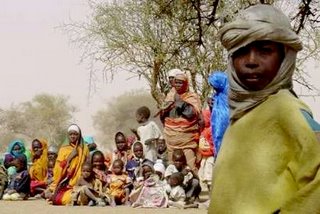Plan B for Darfur
 How will history judge the world's response to the crimes against humanity taking place in Dafur? How might the reaction to this crisis be different were Dafur harboring oil reserves or some other "strategic resource"? It makes you wonder how any country that is in a position to help end the genocide and fails to do so can claim to possess any respect for justice and human life. (GW)
How will history judge the world's response to the crimes against humanity taking place in Dafur? How might the reaction to this crisis be different were Dafur harboring oil reserves or some other "strategic resource"? It makes you wonder how any country that is in a position to help end the genocide and fails to do so can claim to possess any respect for justice and human life. (GW)Turning the screw
January 3, 2007
From Economist.com
Pressure on Sudan's rulers over the violence in Darfur may, inch by inch, produce some results
The pressure on Sudan’s government to put an end to violence in the western region of Darfur is continuing. On Tuesday January 2nd the UN's new secretary-general, Ban Ki-moon, said he would pay particular attention to the situation. In recent weeks aid groups have protested that attacks on their staff make it impossible to operate there. A UN human-rights watchdog says it plans to send a team this month to investigate abuses against civilians. Added to complaints about the situation in Darfur come accusations that Khartoum is exporting violence across Sudan’s borders to Chad and the Central African Republic.
In mid-December Britain’s prime minister, Tony Blair, said he favoured “tougher action” against Khartoum if it continued to resist the deployment of a full UN peacekeeping force. A group of 15 former foreign ministers, from Europe, Asia and America, added that sanctions might be imposed on Khartoum. The outsiders’ sound and fury may, possibly, have had an impact on Sudan's rulers. Late in December it emerged that Khartoum had agreed that a hybrid force of African Union (AU) soldiers and a small number of UN peacekeepers could operate in Darfur. But so far it is unclear how strong that force will be, or what it might achieve.
A small AU peacekeeping force, in Darfur since 2004, has proved hopelessly inadequate. For the past year President Omar al-Bashir has refused to accept 20,000 UN soldiers for Darfur. Although other UN troops are serving in the south of Sudan, Mr Bashir says that any deployed to Darfur would be agents of Western “imperialism”. So the violence continues: more than 200,000 people are thought to have died in Darfur in the past four years. Many have been killed by militias, known as the janjaweed, which are directed by the government in Khartoum.
What would it take for outsiders to persuade Khartoum to accept an effective UN force? Some Western (and other) ministers have begun to propose detailed military and economic sanctions that could be used against Khartoum—often referred to as the Plan B. Nobody is contemplating an invasion of Sudan, but there has been talk of enforcing a no-fly zone over Darfur. This would ground the government’s attack helicopters and Antonov bombers that have killed and terrorised so many. Another military option would be the deployment of UN troops along the Chadian-Darfur border, cauterising the violence in Darfur. Either plan could be carried out from French bases in Chad, avoiding the need to confront Sudanese soldiers on the ground in Darfur.
Some non-military options may otherwise be proposed. Travel bans may be imposed on military and civilian leaders, while assets held by Sudanese leaders overseas may be frozen. Most effective might be measures to target Sudan’s oil revenues, which provide the government with most of its cash. Sales of equipment to maintain the country’s oil infrastructure could be limited, for instance. And in extremis Port Sudan could be blockaded, thus choking off all of Sudan’s oil exports at one stroke.
But most of would depend on getting an international consensus. China, Malaysia, India and Russia are all deeply involved in Sudan’s booming oil industry. These are unlikely to support any sanctions that would hurt their own considerable interests. China, which imports about 5% of its oil from Sudan, has been a staunch supporter of Khartoum. Western countries might try unilateral action, but this is rarely effective. America has maintained comprehensive economic sanctions against Sudan since the mid-1990s, yet the economy is booming.
Nor, even if outsiders could agree on rhetoric for a plan B, is there any guarantee that action would follow. Too often, foreign (and in particular Western) countries have talked tough on Darfur but done nothing. In the past the West has bullied the Sudanese government into making commitments, such as to disarm the janjaweed, but when Khartoum failed to do so there was no follow-up. One reason for Khartoum’s assertiveness against the UN in Darfur is that it has learnt that the West, bogged down in Iraq and Afghanistan, seems to be full of empty threats on this issue. If that perception does not change, nothing else will move fast.


0 Comments:
Post a Comment
<< Home